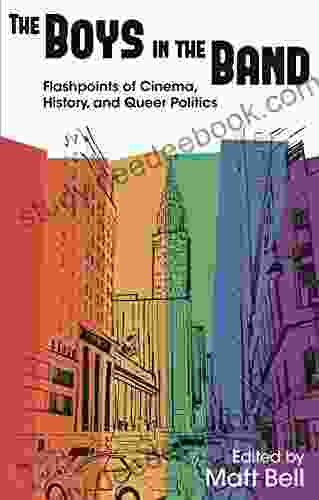Music Fundamentals for Musical Theatre: A Comprehensive Guide

In the captivating realm of musical theatre, music plays a pivotal role in immersing audiences in storytelling, conveying emotions, and providing a rich tapestry for performers to showcase their artistry. Whether you aspire to tread the boards as a leading vocalist, dance your heart out on stage, or orchestrate the musical masterpiece that brings it all together, a grasp of music fundamentals is indispensable.
4.7 out of 5
| Language | : | English |
| File size | : | 52124 KB |
| Text-to-Speech | : | Enabled |
| Enhanced typesetting | : | Enabled |
| Word Wise | : | Enabled |
| Print length | : | 260 pages |
| Screen Reader | : | Supported |
This comprehensive guide will delve into the core principles of music, specifically tailored to the demands of musical theatre. From vocal techniques to rhythmic intricacies, melodic structures to harmonic progressions, we will explore the essential knowledge and skills that will empower you to unlock your musical potential and captivate audiences with your performances.
Vocal Techniques
The human voice is the primary instrument in musical theatre, serving as a powerful tool for expressing emotions, conveying character, and delivering the lyrics that drive the narrative. Mastering vocal techniques is paramount for performers to protect their voices, expand their range, and execute challenging vocal passages with confidence and precision.
Breath Control
Effective breath control is the cornerstone of vocal technique. Proper breathing ensures a steady supply of air, allowing you to sustain notes, control dynamics, and produce clear, resonant tones. Techniques such as diaphragmatic breathing, intercostal breathing, and costal breathing enable performers to regulate their airflow and support their voices throughout their performances.
Articulation
Articulation refers to the manner in which words are pronounced and enunciated. Clear diction is essential for conveying lyrics to the audience and ensuring that the story is effectively communicated. Techniques such as precise consonant articulation, rounded vowels, and diaphragmatic support help performers enhance their diction and project their voices with clarity and power.
Resonance
Resonance is the amplification of sound within the vocal tract, resulting in a rich, full-bodied tone. By manipulating the shape of the mouth, tongue, and soft palate, performers can harness resonance to enhance their vocal projection and create a pleasing sound that carries throughout the theatre.
Rhythm and Meter
Rhythm, the heartbeat of music, provides the framework for musical theatre performances. Understanding rhythm and meter is crucial for performers to interpret musical scores accurately, synchronize their movements with the music, and create a cohesive performance with their fellow cast members.
Meter and Time Signatures
Meter refers to the organization of musical beats into regular patterns. Time signatures, such as 4/4, 3/4, or 6/8, indicate the number of beats per measure and the type of note that receives one beat. Understanding time signatures allows performers to count the rhythm accurately and maintain a steady tempo throughout their performances.
Rhythmic Patterns
Rhythmic patterns are combinations of notes and rests that create the rhythmic structure of a piece of music. Performers must be able to interpret and execute a wide range of rhythmic patterns, including syncopated rhythms, triplet patterns, and dotted rhythms, to accurately convey the composer's intent and create a dynamic and engaging performance.
Harmony and Melody
Harmony, the combination of multiple notes played simultaneously, provides a rich and supportive backdrop for melodies in musical theatre. Understanding harmony and melodic structures is essential for performers to create pleasing and effective vocal harmonies, enhance their musicality, and interpret complex musical scores.
Scales and Intervals
Scales are sequences of notes arranged in ascending or descending order. Intervals are the relationships between two notes. Understanding scales and intervals provides a foundation for performers to build chords, create melodies, and harmonize effectively.
Chord Progressions
Chord progressions are sequences of chords that provide harmonic structure to a piece of music. Performers must be able to identify and interpret chord progressions to accurately sing harmonies, understand the harmonic context of their roles, and create musical transitions that enhance the emotional impact of their performances.
Ear Training and Sight Reading
In the fast-paced world of musical theatre, performers are often required to learn new music quickly and accurately. Ear training and sight reading are essential skills that enable performers to develop their musical instincts, improve their pitch and rhythm accuracy, and navigate complex musical scores with confidence.
Ear Training
Ear training involves developing the ability to recognize and identify musical elements, such as pitch, intervals, chords, and rhythms, by ear. Through exercises and practice, performers can improve their aural skills, allowing them to sing in tune, recognize musical patterns, and learn new music more efficiently.
Sight Reading
Sight reading is the ability to perform music from a written score without prior preparation. It requires performers to have a strong understanding of musical notation, rhythm, and harmony. By developing their sight-reading skills, performers can quickly learn new music, adapt to changes in the score during rehearsals, and confidently perform challenging musical passages.
Music Appreciation and Performance Skills
Beyond the technical aspects of music fundamentals, performers in musical theatre also need to develop their musical appreciation and performance skills to fully embrace the art form and connect with audiences on a deeper level.
Music Appreciation
Music appreciation involves understanding the history, styles, and genres of music. By immersing themselves in different musical styles, performers can broaden their musical horizons, gain insights into the creative process, and appreciate the diverse range of musical expression.
Performance Skills
Performance skills encompass the techniques and artistry involved in bringing musical theatre performances to life. This includes stage presence, characterization, movement, and the ability to convey emotions through song and dance. By honing their performance skills, performers can create compelling and memorable characters, engage audiences, and leave a lasting impression on stage.
Music fundamentals are the cornerstone of musical theatre, providing performers with the essential knowledge and skills to excel on stage. From vocal techniques to rhythmic intricacies, harmonic structures to musical appreciation, a deep understanding of music empowers performers to unlock their full potential, embody their characters, and create performances that captivate and inspire audiences.
By embracing the principles outlined in this guide, you will embark on a transformative journey that will elevate your musicality, ignite your creativity, and pave the way for unforgettable performances in the dynamic world of musical theatre.
4.7 out of 5
| Language | : | English |
| File size | : | 52124 KB |
| Text-to-Speech | : | Enabled |
| Enhanced typesetting | : | Enabled |
| Word Wise | : | Enabled |
| Print length | : | 260 pages |
| Screen Reader | : | Supported |
Do you want to contribute by writing guest posts on this blog?
Please contact us and send us a resume of previous articles that you have written.
 Novel
Novel Page
Page Text
Text Story
Story Reader
Reader Magazine
Magazine Newspaper
Newspaper Bookmark
Bookmark Shelf
Shelf Glossary
Glossary Foreword
Foreword Synopsis
Synopsis Annotation
Annotation Footnote
Footnote Codex
Codex Tome
Tome Bestseller
Bestseller Library card
Library card Biography
Biography Autobiography
Autobiography Memoir
Memoir Reference
Reference Encyclopedia
Encyclopedia Dictionary
Dictionary Narrator
Narrator Resolution
Resolution Librarian
Librarian Catalog
Catalog Borrowing
Borrowing Stacks
Stacks Archives
Archives Research
Research Scholarly
Scholarly Lending
Lending Special Collections
Special Collections Literacy
Literacy Storytelling
Storytelling Awards
Awards Theory
Theory Textbooks
Textbooks Alexander Buychik
Alexander Buychik Carole Massey
Carole Massey Baxter Black
Baxter Black John Nevill
John Nevill Mark Hellinger
Mark Hellinger Taylor Pak
Taylor Pak Storyshopusa
Storyshopusa Krista Ritchie
Krista Ritchie David Scrivener
David Scrivener M Never
M Never Marc Harris
Marc Harris Harriet Hyman Alonso
Harriet Hyman Alonso James S Robbins
James S Robbins Rob Leytham
Rob Leytham Vinod Khosla
Vinod Khosla Wahida Clark
Wahida Clark Kandice Chuh
Kandice Chuh Morwenna Assaf
Morwenna Assaf Pascal Ibiza
Pascal Ibiza Eric J Wittenberg
Eric J Wittenberg
Light bulbAdvertise smarter! Our strategic ad space ensures maximum exposure. Reserve your spot today!

 Mario Vargas LlosaThe Cambridge Companion to Verdi: A Comprehensive Guide to the Life and Works...
Mario Vargas LlosaThe Cambridge Companion to Verdi: A Comprehensive Guide to the Life and Works...
 Deion SimmonsThe Global Uprising Against Poverty Wages: A Call for Justice in the 21st...
Deion SimmonsThe Global Uprising Against Poverty Wages: A Call for Justice in the 21st... Marcus BellFollow ·6.3k
Marcus BellFollow ·6.3k Damon HayesFollow ·9.6k
Damon HayesFollow ·9.6k Donovan CarterFollow ·10.4k
Donovan CarterFollow ·10.4k Dwight BlairFollow ·5.2k
Dwight BlairFollow ·5.2k Colt SimmonsFollow ·5.6k
Colt SimmonsFollow ·5.6k Dallas TurnerFollow ·15.1k
Dallas TurnerFollow ·15.1k Dion ReedFollow ·17.8k
Dion ReedFollow ·17.8k Dwight BellFollow ·4.8k
Dwight BellFollow ·4.8k

 Dominic Simmons
Dominic SimmonsIcky Island: An Unforgettable Adventure for Kids!
Introducing Icky Island: A Delightful One...

 Carlos Fuentes
Carlos FuentesThe Midnight Breed: Embracing the Shadows and Unlocking a...
Welcome to the captivating world of...

 Ike Bell
Ike BellTwelve Steps Toward Political Revelation: A Path to...
Politics, often perceived as a complex and...

 Cameron Reed
Cameron ReedTravels in Arizona Goldfield: Unraveling the Threads of...
Nestled amidst the rugged...

 John Grisham
John GrishamFlashpoints of Cinema History and Queer Politics:...
The relationship between cinema history and...
4.7 out of 5
| Language | : | English |
| File size | : | 52124 KB |
| Text-to-Speech | : | Enabled |
| Enhanced typesetting | : | Enabled |
| Word Wise | : | Enabled |
| Print length | : | 260 pages |
| Screen Reader | : | Supported |










